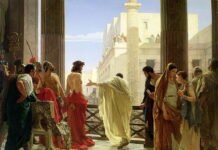Veteran political journalist Peter Oborne’s strangely brilliant analysis of the nemesis of the Conservative Party for Double Down News leads me to some spiritual reflections.
The former Telegraph and Mail political commentator, who has largely forsaken the mainstream media because he believes they are guilty of ‘client journalism’ to the Westminster spin machines, said:
‘We are being governed by what is not the Tory party in its traditional sense, which had connections to the Shires, to manufacturing industry, to the old British establishment. This is a Tory party which is there for the super-rich and the super-rich alone.
‘This explains one of the central mysteries of the (abandoned) Budget. It came from nowhere. No ordinary person wanted tax cuts for the super-rich, but the super-rich did, needless to say.’
When it did pray on public occasions, what Oborne describes as the ‘old British establishment’ turned to the Anglican Book of Common Prayer (BCP). This was true of the late Queen, whose funeral service in Westminster Abbey featured some beautiful BCP Collects (public prayers).
As a committed churchgoer, she would have been familiar with the Collect for today, the 19th Sunday after Trinity. It is glorious in the simplicity of its language and the humility of its attitude: ‘O God, forasmuch as without thee we are not able to please thee; Mercifully grant, that thy Holy Spirit may in all things direct and rule our hearts; through Jesus Christ our Lord. Amen.’
If the prevailing attitude of Britain’s political class is hubris, that is not the mentality of the person who prays this Collect and means it. The petitioner realises his or her spiritual weakness: ‘Without thee we are not able to please thee.’
That spirit of humility is called for by the set BCP Gospel reading for Trinity 19 from Matthew 9: ‘Jesus entered into a ship, and passed over, and came into his own city. And behold, they brought to him a man sick of the palsy, lying on a bed. And Jesus, seeing their faith, said unto the sick of the palsy, Son, be of good cheer, thy sins be forgiven thee.’
Whatever the petitioner’s social status or personal circumstances, he or she comes before God as a helpless sinner. As the BCP Confession at Morning and Evening Prayer expresses it: ‘We have left undone those things which we ought to have done; And we have done those things which we ought not to have done; And there is no health in us. But thou, O Lord, have mercy on us, miserable offenders.’
Read it all in Christian Today
Julian Mann is a former Church of England vicar, now an evangelical journalist.



